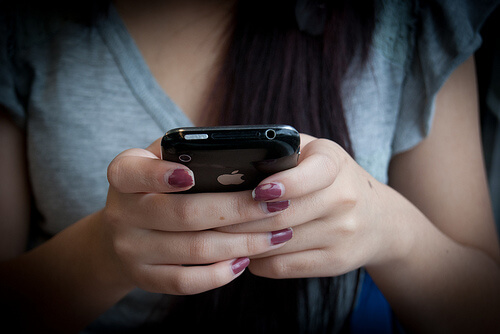
Do you remember life without Siri? Seeing photos of friends and family meant a scrapbook. Road trips meant hours plotting your course on foldout maps. A social gathering had to be planned by landline hours beforehand. E-mails could be read only after your computer booted up. A research paper required hours of flipping through musty pages. Not too long ago, most people viewed the instant access of information as a concept out of “Back to the Future.”
Smartphones have undeniably revolutionized the way we communicate and receive information, but has this new convenience cost Millennials the benefits of a traditional education? In a classroom of 500 students, hands hold iPhones and fingers carefully choose emojis rather than filling empty notebooks with the day’s lectures. While smartphones create new opportunities for furthering the pursuit of knowledge, they also pose new mediums for distraction.
Smartphones have become more commonplace than textbooks. Curt Chandler, a senior lecturer at Penn State noted that in a recent poll of his students, only one out of 120 lacked a smartphone.
Smartphones have the potential to provide previously unfathomable benefits to the traditional classroom setting. When lessons seem unclear or a student simply desires to know more, obtaining additional information or fact checking merely requires starting a Google search on your phone. Penn State student Zach Wright uses his smartphone to stay up-to-date with his assignments. “Its great to use my phone to make sure I didn’t miss any deadline or other information when I’m sitting in class.”

Many professors realize the potential of smartphones and even require them in class activities. Penn State senior lecturer Rod Bingaman said that his film students occasionally use their phones on set as walkie-talkies. Chandler has gone as far as actually incorporating phones into his lessons and assignments. In the past he assigned his students to use Instagram to cover a campus charity event. “Smartphones are so commonplace now that it allows me to incorporate using social media into class assignments,” he said.
Unfortunately, more interactive learning comes at a cost. Professors across the nation said that smartphones leave their students more distracted and detached from classroom activites. Rather than engaging in lectures, students increasingly scroll down newsfeeds. “The cell phone has taken the place of daydreaming and doodling for some students,” Bingaman said.
Students consistently have their eyes glued to their phones, whether they’re tweeting or asking their roommate what’s for dinner. “Sometimes I’m so into my phone that class disrupts my Facebook/Buzzfeed/Pinterest time,” said Penn State student Emily Pearlman. University of Pittsburgh literature professor David Brumble noticed that in his class of 100 or more students, class members distract themselves with cell phones, tablets and laptops.
Such distractions have left students more detached from professors and their lessons alike. The ideal Dead Poet’s Society-like relationship between student and teacher could very well become a thing of the past. Commenting on how professors need to adapt the way they transmit information, Dr. John Lyne, a professor of Communication at the University of Pittsburgh asked, “Why sit in class and transcribe if you can access the information instantly?”
In an attempt to combat this trend, many lecturers and professors like Anthony Collings of the University of Michigan have banned smartphones from their classrooms. Julia Kasdorf, a professor of English and women’s studies at Penn State operates her classroom on a “no cell phones on the desk” policy. Though she admitted that cell phones weren’t absent under the desks. “I would prefer that we look one another in the eye and attempt to communicate, to argue, to explain ourselves, to make meaning in conversation.”
This desire for a more traditional setting may prove too trying for some students. Explaining the reliance some students have on their phones, Lyne said that asking them to refrain from use might as well be a request to “please shut down the right side of your brain and pay attention.”
Smartphones have created challenges for both students and those entrusted with their education. Their ability to distract should not outweigh the benefit of having a world of knowledge at your fingertips (literally). As students, we need to learn how to separate ourselves from our phones, even if just for fifty minutes. Despite rightfully saying that students need to be responsible for the choices they make in the classroom, Chandler said,“It's also on me to make my classes engaging enough to keep their attention.”
Adapting smartphones to the curriculum will be a dual endeavor. While students need to learn to leave Pinterest at the door, professors must modify the way they teach to cater to the instant information generation.
(Main image via collegescholarships.com)
Maybe you should also ask yourself: Is Facebook Hurting Your Life?



















